Corporate Law Assignment: Director's Duties, Insolvency, and Liability
VerifiedAdded on 2022/11/18
|12
|2710
|219
Report
AI Summary
This report examines key aspects of Australian corporate law, specifically focusing on the duties and liabilities of company directors. The assignment addresses the fiduciary and statutory duties of directors, including the duty to act with care, diligence, and in good faith, and the duty to prevent insolvent trading under the Corporations Act 2001. The report analyzes the concept of insolvent trading, the defenses available to directors, such as the safe harbor provision and the business judgment rule, and the restrictions on the operation of these defenses. The report then presents a case study involving breaches of director's duties, including misuse of company funds and failure to disclose financial information, and assesses the potential liabilities of the directors involved. The analysis covers various sections of the Corporations Act and provides insights into the legal implications of director's actions in situations of financial distress and insolvency. The report concludes with a discussion of the risks faced by creditors in the context of insolvent trading and the impact of changes in the law on director's behavior.
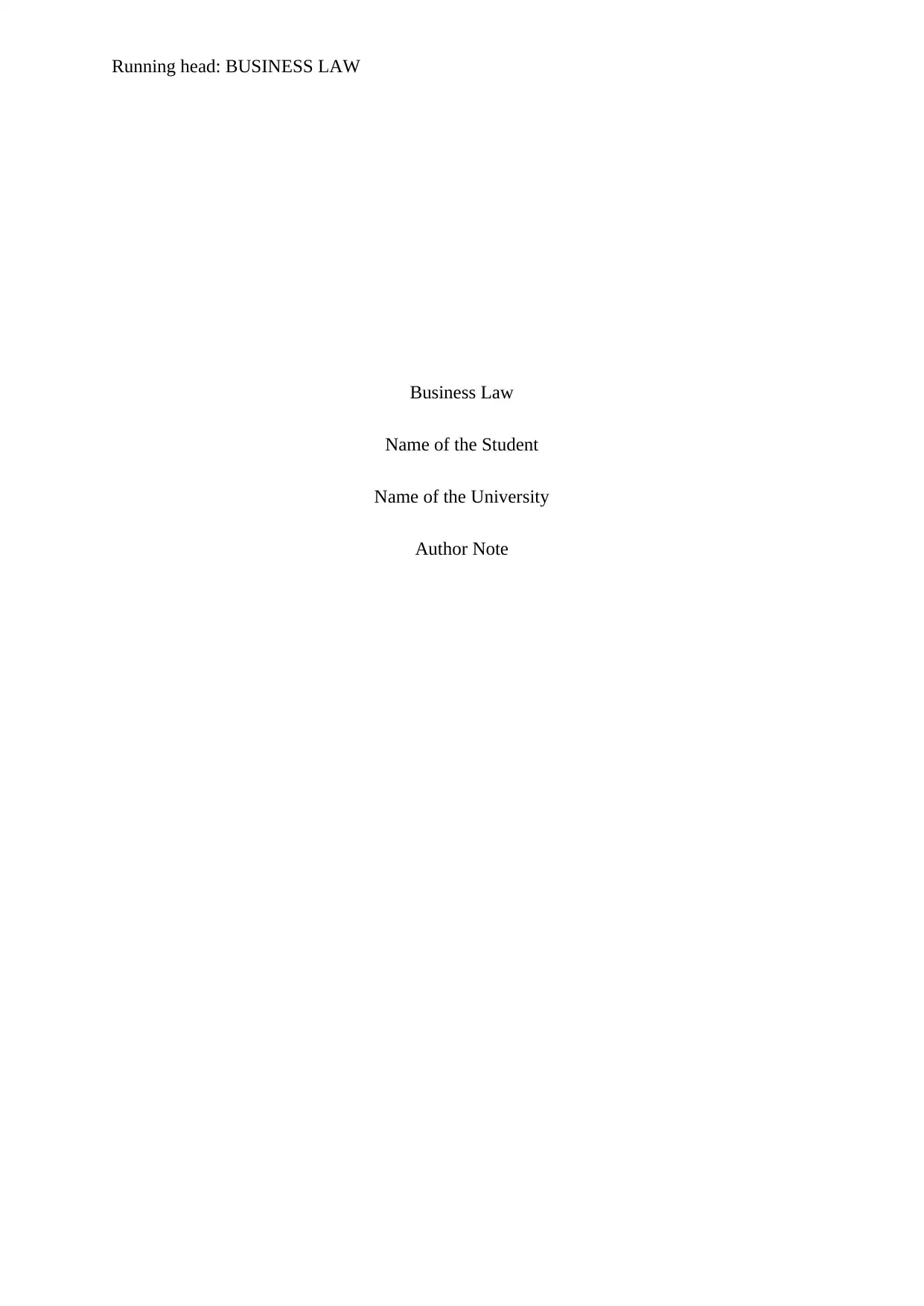
Running head: BUSINESS LAW
Business Law
Name of the Student
Name of the University
Author Note
Business Law
Name of the Student
Name of the University
Author Note
Paraphrase This Document
Need a fresh take? Get an instant paraphrase of this document with our AI Paraphraser

1BUSINESS LAW
Table of Contents
Part A.........................................................................................................................................2
Part B..........................................................................................................................................6
References................................................................................................................................11
Table of Contents
Part A.........................................................................................................................................2
Part B..........................................................................................................................................6
References................................................................................................................................11
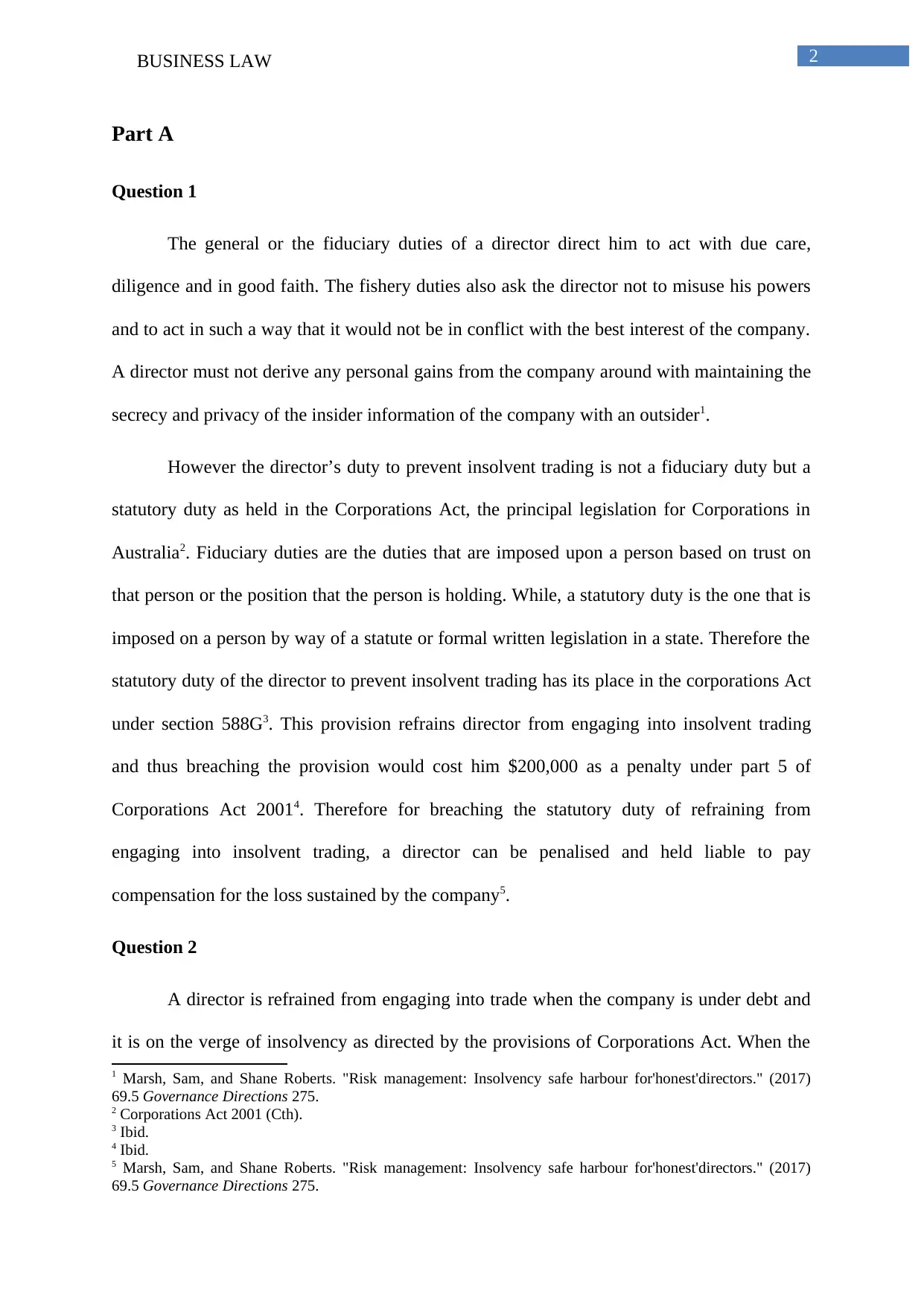
2BUSINESS LAW
Part A
Question 1
The general or the fiduciary duties of a director direct him to act with due care,
diligence and in good faith. The fishery duties also ask the director not to misuse his powers
and to act in such a way that it would not be in conflict with the best interest of the company.
A director must not derive any personal gains from the company around with maintaining the
secrecy and privacy of the insider information of the company with an outsider1.
However the director’s duty to prevent insolvent trading is not a fiduciary duty but a
statutory duty as held in the Corporations Act, the principal legislation for Corporations in
Australia2. Fiduciary duties are the duties that are imposed upon a person based on trust on
that person or the position that the person is holding. While, a statutory duty is the one that is
imposed on a person by way of a statute or formal written legislation in a state. Therefore the
statutory duty of the director to prevent insolvent trading has its place in the corporations Act
under section 588G3. This provision refrains director from engaging into insolvent trading
and thus breaching the provision would cost him $200,000 as a penalty under part 5 of
Corporations Act 20014. Therefore for breaching the statutory duty of refraining from
engaging into insolvent trading, a director can be penalised and held liable to pay
compensation for the loss sustained by the company5.
Question 2
A director is refrained from engaging into trade when the company is under debt and
it is on the verge of insolvency as directed by the provisions of Corporations Act. When the
1 Marsh, Sam, and Shane Roberts. "Risk management: Insolvency safe harbour for'honest'directors." (2017)
69.5 Governance Directions 275.
2 Corporations Act 2001 (Cth).
3 Ibid.
4 Ibid.
5 Marsh, Sam, and Shane Roberts. "Risk management: Insolvency safe harbour for'honest'directors." (2017)
69.5 Governance Directions 275.
Part A
Question 1
The general or the fiduciary duties of a director direct him to act with due care,
diligence and in good faith. The fishery duties also ask the director not to misuse his powers
and to act in such a way that it would not be in conflict with the best interest of the company.
A director must not derive any personal gains from the company around with maintaining the
secrecy and privacy of the insider information of the company with an outsider1.
However the director’s duty to prevent insolvent trading is not a fiduciary duty but a
statutory duty as held in the Corporations Act, the principal legislation for Corporations in
Australia2. Fiduciary duties are the duties that are imposed upon a person based on trust on
that person or the position that the person is holding. While, a statutory duty is the one that is
imposed on a person by way of a statute or formal written legislation in a state. Therefore the
statutory duty of the director to prevent insolvent trading has its place in the corporations Act
under section 588G3. This provision refrains director from engaging into insolvent trading
and thus breaching the provision would cost him $200,000 as a penalty under part 5 of
Corporations Act 20014. Therefore for breaching the statutory duty of refraining from
engaging into insolvent trading, a director can be penalised and held liable to pay
compensation for the loss sustained by the company5.
Question 2
A director is refrained from engaging into trade when the company is under debt and
it is on the verge of insolvency as directed by the provisions of Corporations Act. When the
1 Marsh, Sam, and Shane Roberts. "Risk management: Insolvency safe harbour for'honest'directors." (2017)
69.5 Governance Directions 275.
2 Corporations Act 2001 (Cth).
3 Ibid.
4 Ibid.
5 Marsh, Sam, and Shane Roberts. "Risk management: Insolvency safe harbour for'honest'directors." (2017)
69.5 Governance Directions 275.
⊘ This is a preview!⊘
Do you want full access?
Subscribe today to unlock all pages.

Trusted by 1+ million students worldwide
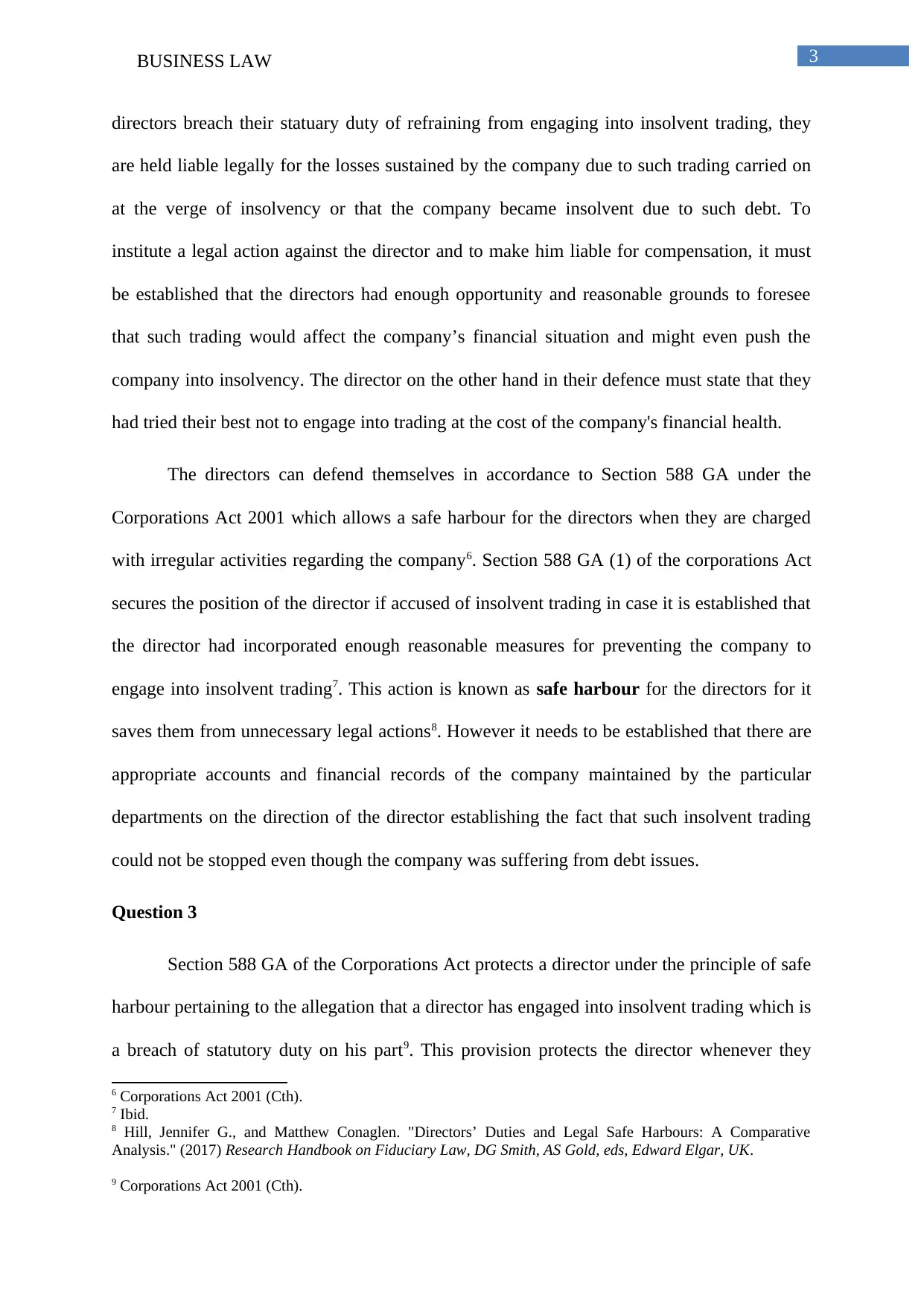
3BUSINESS LAW
directors breach their statuary duty of refraining from engaging into insolvent trading, they
are held liable legally for the losses sustained by the company due to such trading carried on
at the verge of insolvency or that the company became insolvent due to such debt. To
institute a legal action against the director and to make him liable for compensation, it must
be established that the directors had enough opportunity and reasonable grounds to foresee
that such trading would affect the company’s financial situation and might even push the
company into insolvency. The director on the other hand in their defence must state that they
had tried their best not to engage into trading at the cost of the company's financial health.
The directors can defend themselves in accordance to Section 588 GA under the
Corporations Act 2001 which allows a safe harbour for the directors when they are charged
with irregular activities regarding the company6. Section 588 GA (1) of the corporations Act
secures the position of the director if accused of insolvent trading in case it is established that
the director had incorporated enough reasonable measures for preventing the company to
engage into insolvent trading7. This action is known as safe harbour for the directors for it
saves them from unnecessary legal actions8. However it needs to be established that there are
appropriate accounts and financial records of the company maintained by the particular
departments on the direction of the director establishing the fact that such insolvent trading
could not be stopped even though the company was suffering from debt issues.
Question 3
Section 588 GA of the Corporations Act protects a director under the principle of safe
harbour pertaining to the allegation that a director has engaged into insolvent trading which is
a breach of statutory duty on his part9. This provision protects the director whenever they
6 Corporations Act 2001 (Cth).
7 Ibid.
8 Hill, Jennifer G., and Matthew Conaglen. "Directors’ Duties and Legal Safe Harbours: A Comparative
Analysis." (2017) Research Handbook on Fiduciary Law, DG Smith, AS Gold, eds, Edward Elgar, UK.
9 Corporations Act 2001 (Cth).
directors breach their statuary duty of refraining from engaging into insolvent trading, they
are held liable legally for the losses sustained by the company due to such trading carried on
at the verge of insolvency or that the company became insolvent due to such debt. To
institute a legal action against the director and to make him liable for compensation, it must
be established that the directors had enough opportunity and reasonable grounds to foresee
that such trading would affect the company’s financial situation and might even push the
company into insolvency. The director on the other hand in their defence must state that they
had tried their best not to engage into trading at the cost of the company's financial health.
The directors can defend themselves in accordance to Section 588 GA under the
Corporations Act 2001 which allows a safe harbour for the directors when they are charged
with irregular activities regarding the company6. Section 588 GA (1) of the corporations Act
secures the position of the director if accused of insolvent trading in case it is established that
the director had incorporated enough reasonable measures for preventing the company to
engage into insolvent trading7. This action is known as safe harbour for the directors for it
saves them from unnecessary legal actions8. However it needs to be established that there are
appropriate accounts and financial records of the company maintained by the particular
departments on the direction of the director establishing the fact that such insolvent trading
could not be stopped even though the company was suffering from debt issues.
Question 3
Section 588 GA of the Corporations Act protects a director under the principle of safe
harbour pertaining to the allegation that a director has engaged into insolvent trading which is
a breach of statutory duty on his part9. This provision protects the director whenever they
6 Corporations Act 2001 (Cth).
7 Ibid.
8 Hill, Jennifer G., and Matthew Conaglen. "Directors’ Duties and Legal Safe Harbours: A Comparative
Analysis." (2017) Research Handbook on Fiduciary Law, DG Smith, AS Gold, eds, Edward Elgar, UK.
9 Corporations Act 2001 (Cth).
Paraphrase This Document
Need a fresh take? Get an instant paraphrase of this document with our AI Paraphraser
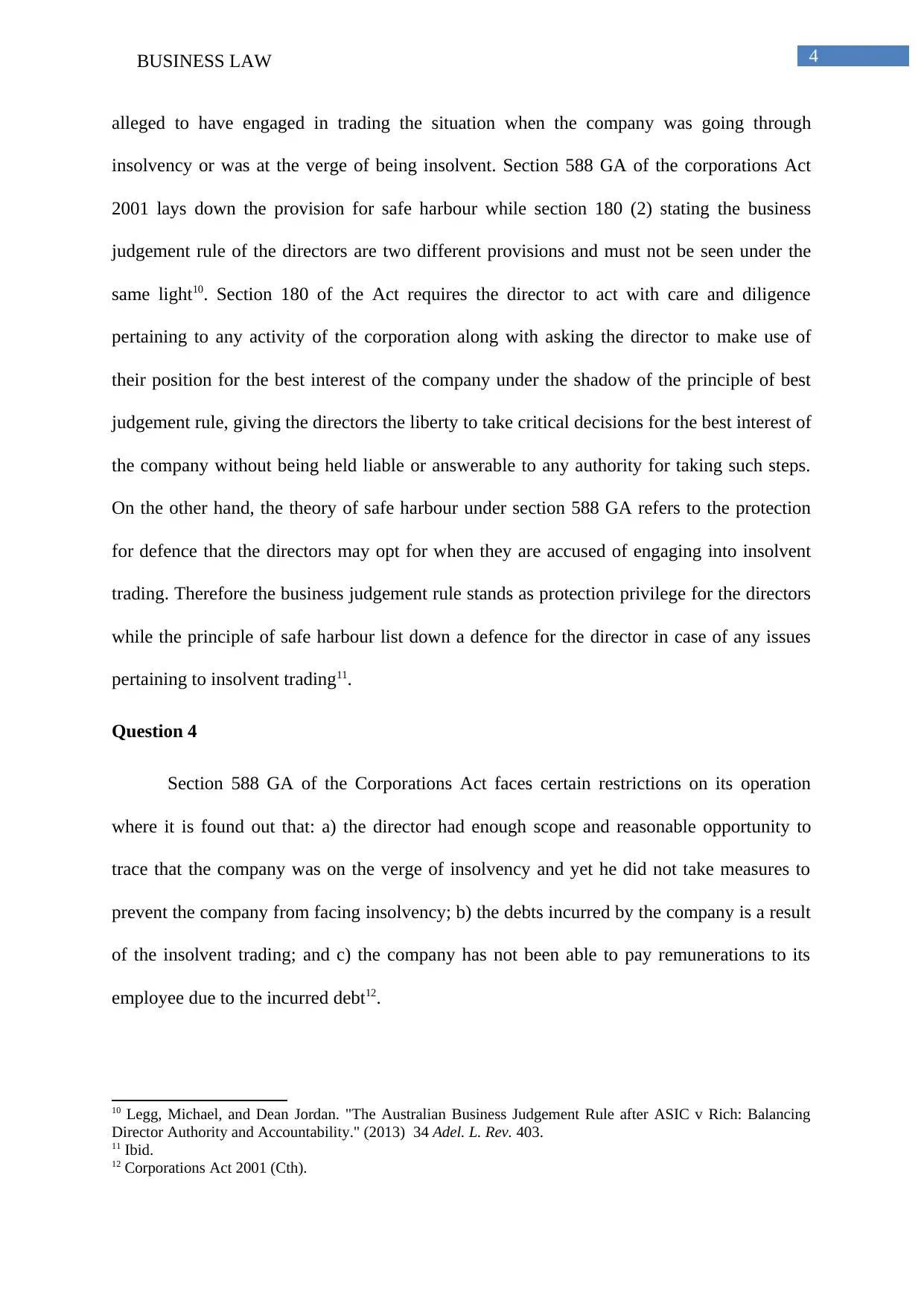
4BUSINESS LAW
alleged to have engaged in trading the situation when the company was going through
insolvency or was at the verge of being insolvent. Section 588 GA of the corporations Act
2001 lays down the provision for safe harbour while section 180 (2) stating the business
judgement rule of the directors are two different provisions and must not be seen under the
same light10. Section 180 of the Act requires the director to act with care and diligence
pertaining to any activity of the corporation along with asking the director to make use of
their position for the best interest of the company under the shadow of the principle of best
judgement rule, giving the directors the liberty to take critical decisions for the best interest of
the company without being held liable or answerable to any authority for taking such steps.
On the other hand, the theory of safe harbour under section 588 GA refers to the protection
for defence that the directors may opt for when they are accused of engaging into insolvent
trading. Therefore the business judgement rule stands as protection privilege for the directors
while the principle of safe harbour list down a defence for the director in case of any issues
pertaining to insolvent trading11.
Question 4
Section 588 GA of the Corporations Act faces certain restrictions on its operation
where it is found out that: a) the director had enough scope and reasonable opportunity to
trace that the company was on the verge of insolvency and yet he did not take measures to
prevent the company from facing insolvency; b) the debts incurred by the company is a result
of the insolvent trading; and c) the company has not been able to pay remunerations to its
employee due to the incurred debt12.
10 Legg, Michael, and Dean Jordan. "The Australian Business Judgement Rule after ASIC v Rich: Balancing
Director Authority and Accountability." (2013) 34 Adel. L. Rev. 403.
11 Ibid.
12 Corporations Act 2001 (Cth).
alleged to have engaged in trading the situation when the company was going through
insolvency or was at the verge of being insolvent. Section 588 GA of the corporations Act
2001 lays down the provision for safe harbour while section 180 (2) stating the business
judgement rule of the directors are two different provisions and must not be seen under the
same light10. Section 180 of the Act requires the director to act with care and diligence
pertaining to any activity of the corporation along with asking the director to make use of
their position for the best interest of the company under the shadow of the principle of best
judgement rule, giving the directors the liberty to take critical decisions for the best interest of
the company without being held liable or answerable to any authority for taking such steps.
On the other hand, the theory of safe harbour under section 588 GA refers to the protection
for defence that the directors may opt for when they are accused of engaging into insolvent
trading. Therefore the business judgement rule stands as protection privilege for the directors
while the principle of safe harbour list down a defence for the director in case of any issues
pertaining to insolvent trading11.
Question 4
Section 588 GA of the Corporations Act faces certain restrictions on its operation
where it is found out that: a) the director had enough scope and reasonable opportunity to
trace that the company was on the verge of insolvency and yet he did not take measures to
prevent the company from facing insolvency; b) the debts incurred by the company is a result
of the insolvent trading; and c) the company has not been able to pay remunerations to its
employee due to the incurred debt12.
10 Legg, Michael, and Dean Jordan. "The Australian Business Judgement Rule after ASIC v Rich: Balancing
Director Authority and Accountability." (2013) 34 Adel. L. Rev. 403.
11 Ibid.
12 Corporations Act 2001 (Cth).
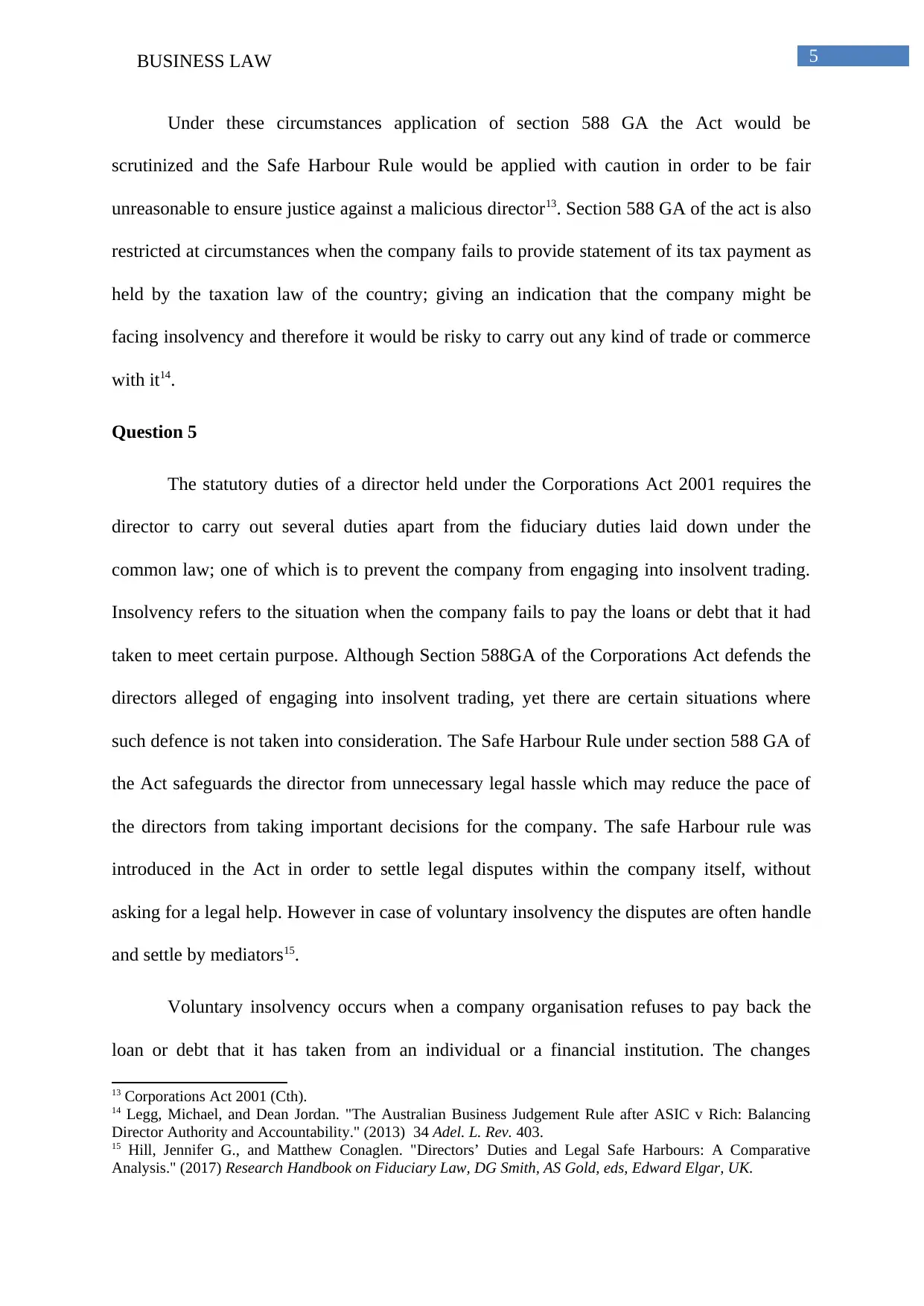
5BUSINESS LAW
Under these circumstances application of section 588 GA the Act would be
scrutinized and the Safe Harbour Rule would be applied with caution in order to be fair
unreasonable to ensure justice against a malicious director13. Section 588 GA of the act is also
restricted at circumstances when the company fails to provide statement of its tax payment as
held by the taxation law of the country; giving an indication that the company might be
facing insolvency and therefore it would be risky to carry out any kind of trade or commerce
with it14.
Question 5
The statutory duties of a director held under the Corporations Act 2001 requires the
director to carry out several duties apart from the fiduciary duties laid down under the
common law; one of which is to prevent the company from engaging into insolvent trading.
Insolvency refers to the situation when the company fails to pay the loans or debt that it had
taken to meet certain purpose. Although Section 588GA of the Corporations Act defends the
directors alleged of engaging into insolvent trading, yet there are certain situations where
such defence is not taken into consideration. The Safe Harbour Rule under section 588 GA of
the Act safeguards the director from unnecessary legal hassle which may reduce the pace of
the directors from taking important decisions for the company. The safe Harbour rule was
introduced in the Act in order to settle legal disputes within the company itself, without
asking for a legal help. However in case of voluntary insolvency the disputes are often handle
and settle by mediators15.
Voluntary insolvency occurs when a company organisation refuses to pay back the
loan or debt that it has taken from an individual or a financial institution. The changes
13 Corporations Act 2001 (Cth).
14 Legg, Michael, and Dean Jordan. "The Australian Business Judgement Rule after ASIC v Rich: Balancing
Director Authority and Accountability." (2013) 34 Adel. L. Rev. 403.
15 Hill, Jennifer G., and Matthew Conaglen. "Directors’ Duties and Legal Safe Harbours: A Comparative
Analysis." (2017) Research Handbook on Fiduciary Law, DG Smith, AS Gold, eds, Edward Elgar, UK.
Under these circumstances application of section 588 GA the Act would be
scrutinized and the Safe Harbour Rule would be applied with caution in order to be fair
unreasonable to ensure justice against a malicious director13. Section 588 GA of the act is also
restricted at circumstances when the company fails to provide statement of its tax payment as
held by the taxation law of the country; giving an indication that the company might be
facing insolvency and therefore it would be risky to carry out any kind of trade or commerce
with it14.
Question 5
The statutory duties of a director held under the Corporations Act 2001 requires the
director to carry out several duties apart from the fiduciary duties laid down under the
common law; one of which is to prevent the company from engaging into insolvent trading.
Insolvency refers to the situation when the company fails to pay the loans or debt that it had
taken to meet certain purpose. Although Section 588GA of the Corporations Act defends the
directors alleged of engaging into insolvent trading, yet there are certain situations where
such defence is not taken into consideration. The Safe Harbour Rule under section 588 GA of
the Act safeguards the director from unnecessary legal hassle which may reduce the pace of
the directors from taking important decisions for the company. The safe Harbour rule was
introduced in the Act in order to settle legal disputes within the company itself, without
asking for a legal help. However in case of voluntary insolvency the disputes are often handle
and settle by mediators15.
Voluntary insolvency occurs when a company organisation refuses to pay back the
loan or debt that it has taken from an individual or a financial institution. The changes
13 Corporations Act 2001 (Cth).
14 Legg, Michael, and Dean Jordan. "The Australian Business Judgement Rule after ASIC v Rich: Balancing
Director Authority and Accountability." (2013) 34 Adel. L. Rev. 403.
15 Hill, Jennifer G., and Matthew Conaglen. "Directors’ Duties and Legal Safe Harbours: A Comparative
Analysis." (2017) Research Handbook on Fiduciary Law, DG Smith, AS Gold, eds, Edward Elgar, UK.
⊘ This is a preview!⊘
Do you want full access?
Subscribe today to unlock all pages.

Trusted by 1+ million students worldwide
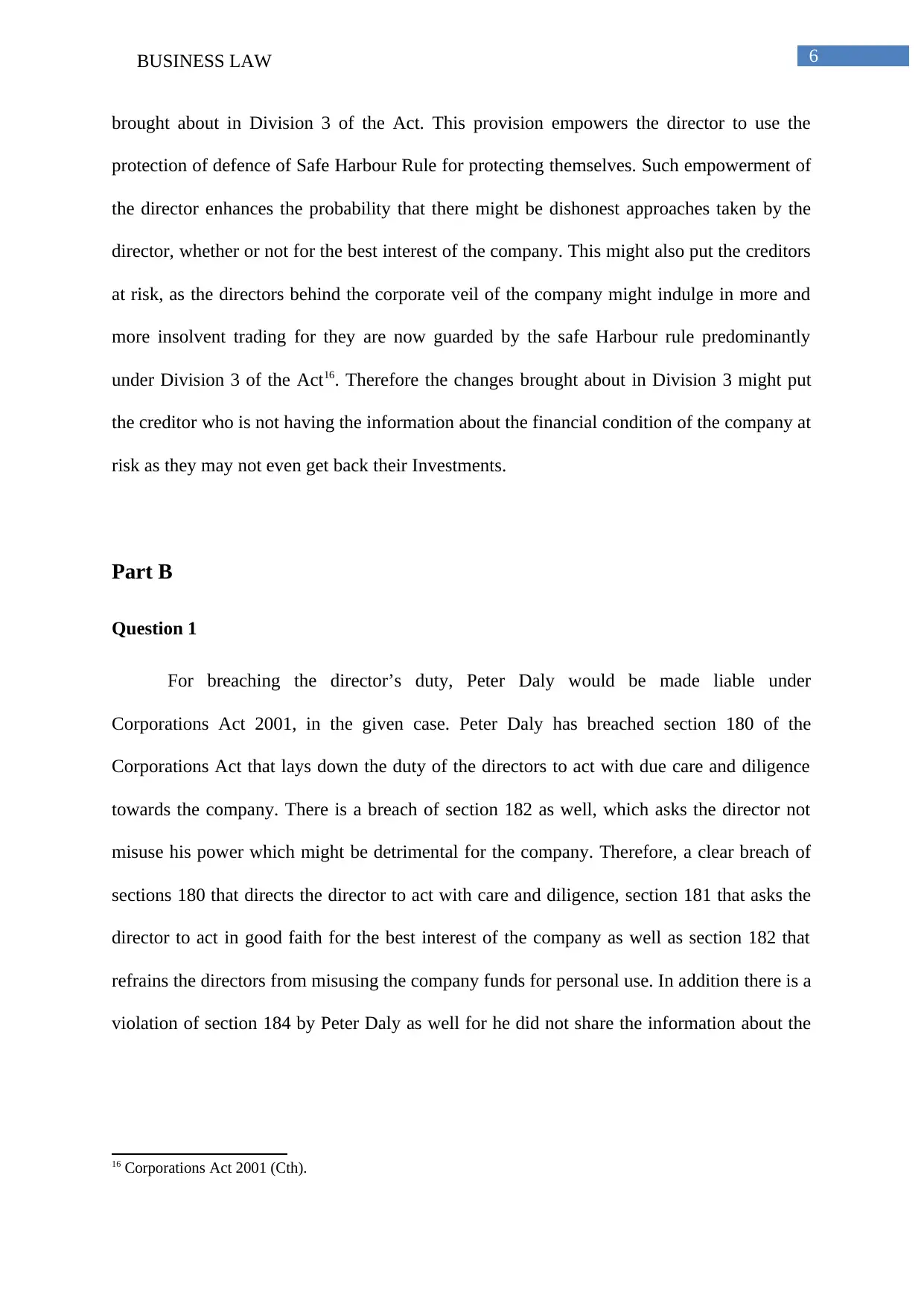
6BUSINESS LAW
brought about in Division 3 of the Act. This provision empowers the director to use the
protection of defence of Safe Harbour Rule for protecting themselves. Such empowerment of
the director enhances the probability that there might be dishonest approaches taken by the
director, whether or not for the best interest of the company. This might also put the creditors
at risk, as the directors behind the corporate veil of the company might indulge in more and
more insolvent trading for they are now guarded by the safe Harbour rule predominantly
under Division 3 of the Act16. Therefore the changes brought about in Division 3 might put
the creditor who is not having the information about the financial condition of the company at
risk as they may not even get back their Investments.
Part B
Question 1
For breaching the director’s duty, Peter Daly would be made liable under
Corporations Act 2001, in the given case. Peter Daly has breached section 180 of the
Corporations Act that lays down the duty of the directors to act with due care and diligence
towards the company. There is a breach of section 182 as well, which asks the director not
misuse his power which might be detrimental for the company. Therefore, a clear breach of
sections 180 that directs the director to act with care and diligence, section 181 that asks the
director to act in good faith for the best interest of the company as well as section 182 that
refrains the directors from misusing the company funds for personal use. In addition there is a
violation of section 184 by Peter Daly as well for he did not share the information about the
16 Corporations Act 2001 (Cth).
brought about in Division 3 of the Act. This provision empowers the director to use the
protection of defence of Safe Harbour Rule for protecting themselves. Such empowerment of
the director enhances the probability that there might be dishonest approaches taken by the
director, whether or not for the best interest of the company. This might also put the creditors
at risk, as the directors behind the corporate veil of the company might indulge in more and
more insolvent trading for they are now guarded by the safe Harbour rule predominantly
under Division 3 of the Act16. Therefore the changes brought about in Division 3 might put
the creditor who is not having the information about the financial condition of the company at
risk as they may not even get back their Investments.
Part B
Question 1
For breaching the director’s duty, Peter Daly would be made liable under
Corporations Act 2001, in the given case. Peter Daly has breached section 180 of the
Corporations Act that lays down the duty of the directors to act with due care and diligence
towards the company. There is a breach of section 182 as well, which asks the director not
misuse his power which might be detrimental for the company. Therefore, a clear breach of
sections 180 that directs the director to act with care and diligence, section 181 that asks the
director to act in good faith for the best interest of the company as well as section 182 that
refrains the directors from misusing the company funds for personal use. In addition there is a
violation of section 184 by Peter Daly as well for he did not share the information about the
16 Corporations Act 2001 (Cth).
Paraphrase This Document
Need a fresh take? Get an instant paraphrase of this document with our AI Paraphraser
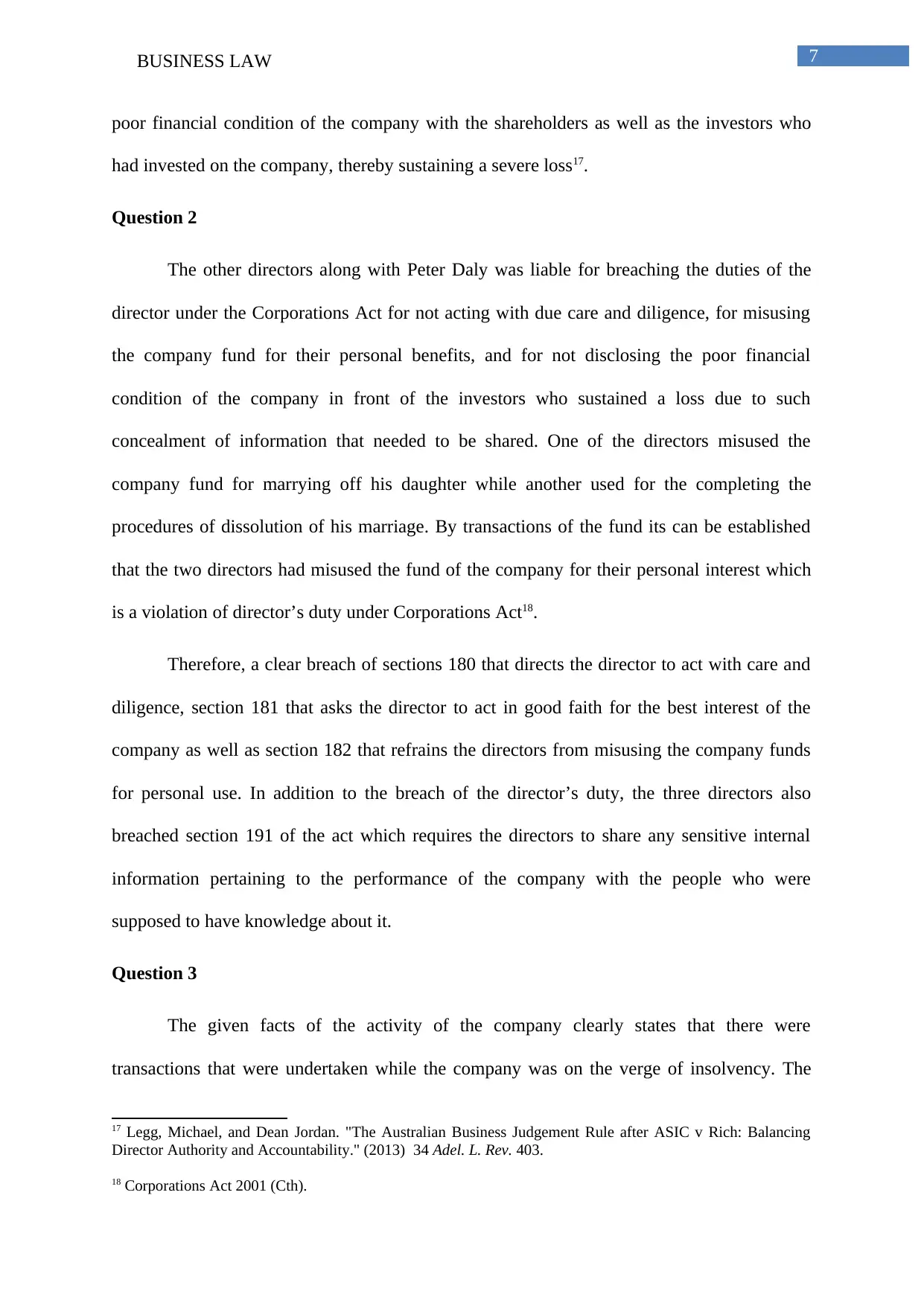
7BUSINESS LAW
poor financial condition of the company with the shareholders as well as the investors who
had invested on the company, thereby sustaining a severe loss17.
Question 2
The other directors along with Peter Daly was liable for breaching the duties of the
director under the Corporations Act for not acting with due care and diligence, for misusing
the company fund for their personal benefits, and for not disclosing the poor financial
condition of the company in front of the investors who sustained a loss due to such
concealment of information that needed to be shared. One of the directors misused the
company fund for marrying off his daughter while another used for the completing the
procedures of dissolution of his marriage. By transactions of the fund its can be established
that the two directors had misused the fund of the company for their personal interest which
is a violation of director’s duty under Corporations Act18.
Therefore, a clear breach of sections 180 that directs the director to act with care and
diligence, section 181 that asks the director to act in good faith for the best interest of the
company as well as section 182 that refrains the directors from misusing the company funds
for personal use. In addition to the breach of the director’s duty, the three directors also
breached section 191 of the act which requires the directors to share any sensitive internal
information pertaining to the performance of the company with the people who were
supposed to have knowledge about it.
Question 3
The given facts of the activity of the company clearly states that there were
transactions that were undertaken while the company was on the verge of insolvency. The
17 Legg, Michael, and Dean Jordan. "The Australian Business Judgement Rule after ASIC v Rich: Balancing
Director Authority and Accountability." (2013) 34 Adel. L. Rev. 403.
18 Corporations Act 2001 (Cth).
poor financial condition of the company with the shareholders as well as the investors who
had invested on the company, thereby sustaining a severe loss17.
Question 2
The other directors along with Peter Daly was liable for breaching the duties of the
director under the Corporations Act for not acting with due care and diligence, for misusing
the company fund for their personal benefits, and for not disclosing the poor financial
condition of the company in front of the investors who sustained a loss due to such
concealment of information that needed to be shared. One of the directors misused the
company fund for marrying off his daughter while another used for the completing the
procedures of dissolution of his marriage. By transactions of the fund its can be established
that the two directors had misused the fund of the company for their personal interest which
is a violation of director’s duty under Corporations Act18.
Therefore, a clear breach of sections 180 that directs the director to act with care and
diligence, section 181 that asks the director to act in good faith for the best interest of the
company as well as section 182 that refrains the directors from misusing the company funds
for personal use. In addition to the breach of the director’s duty, the three directors also
breached section 191 of the act which requires the directors to share any sensitive internal
information pertaining to the performance of the company with the people who were
supposed to have knowledge about it.
Question 3
The given facts of the activity of the company clearly states that there were
transactions that were undertaken while the company was on the verge of insolvency. The
17 Legg, Michael, and Dean Jordan. "The Australian Business Judgement Rule after ASIC v Rich: Balancing
Director Authority and Accountability." (2013) 34 Adel. L. Rev. 403.
18 Corporations Act 2001 (Cth).
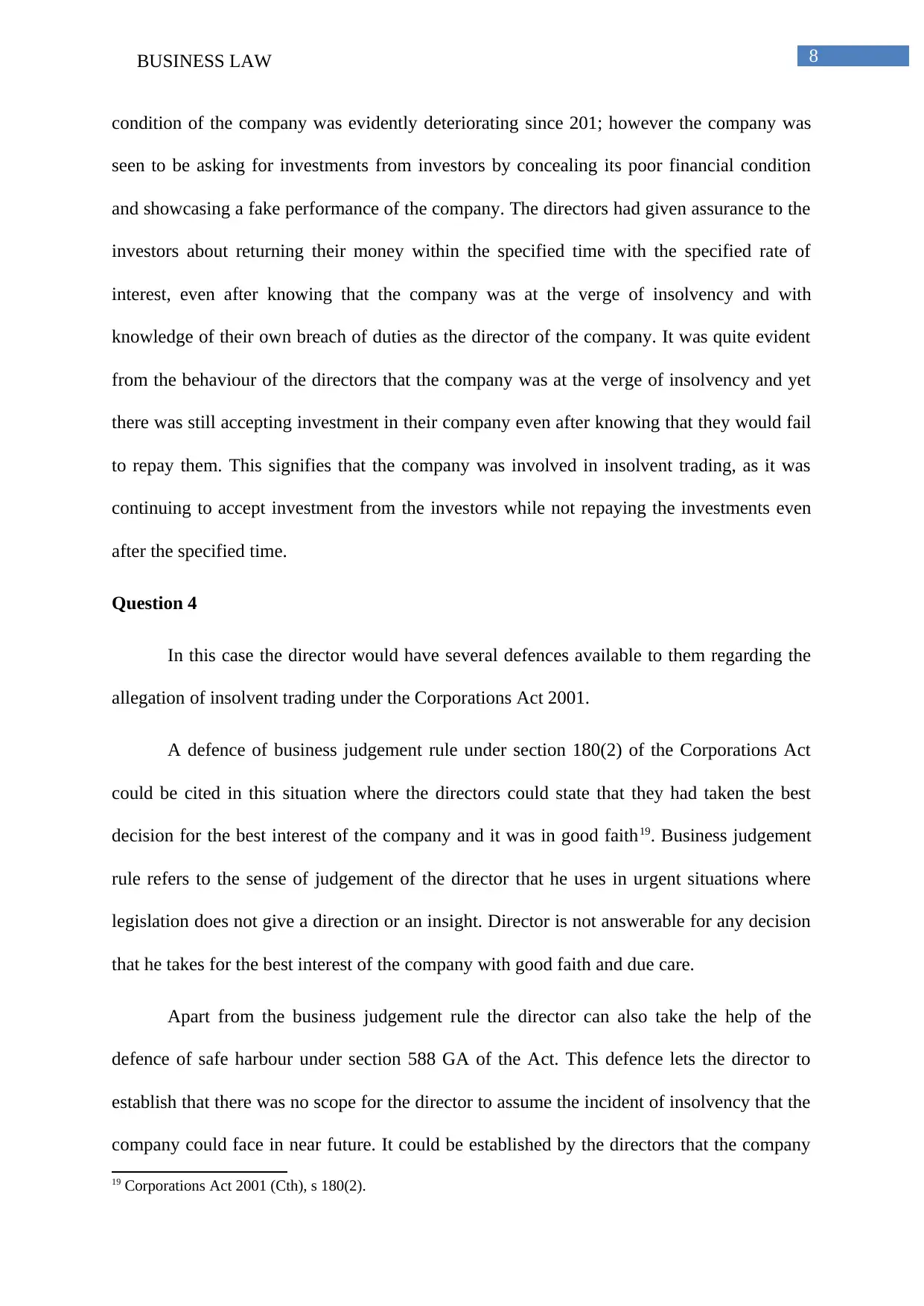
8BUSINESS LAW
condition of the company was evidently deteriorating since 201; however the company was
seen to be asking for investments from investors by concealing its poor financial condition
and showcasing a fake performance of the company. The directors had given assurance to the
investors about returning their money within the specified time with the specified rate of
interest, even after knowing that the company was at the verge of insolvency and with
knowledge of their own breach of duties as the director of the company. It was quite evident
from the behaviour of the directors that the company was at the verge of insolvency and yet
there was still accepting investment in their company even after knowing that they would fail
to repay them. This signifies that the company was involved in insolvent trading, as it was
continuing to accept investment from the investors while not repaying the investments even
after the specified time.
Question 4
In this case the director would have several defences available to them regarding the
allegation of insolvent trading under the Corporations Act 2001.
A defence of business judgement rule under section 180(2) of the Corporations Act
could be cited in this situation where the directors could state that they had taken the best
decision for the best interest of the company and it was in good faith19. Business judgement
rule refers to the sense of judgement of the director that he uses in urgent situations where
legislation does not give a direction or an insight. Director is not answerable for any decision
that he takes for the best interest of the company with good faith and due care.
Apart from the business judgement rule the director can also take the help of the
defence of safe harbour under section 588 GA of the Act. This defence lets the director to
establish that there was no scope for the director to assume the incident of insolvency that the
company could face in near future. It could be established by the directors that the company
19 Corporations Act 2001 (Cth), s 180(2).
condition of the company was evidently deteriorating since 201; however the company was
seen to be asking for investments from investors by concealing its poor financial condition
and showcasing a fake performance of the company. The directors had given assurance to the
investors about returning their money within the specified time with the specified rate of
interest, even after knowing that the company was at the verge of insolvency and with
knowledge of their own breach of duties as the director of the company. It was quite evident
from the behaviour of the directors that the company was at the verge of insolvency and yet
there was still accepting investment in their company even after knowing that they would fail
to repay them. This signifies that the company was involved in insolvent trading, as it was
continuing to accept investment from the investors while not repaying the investments even
after the specified time.
Question 4
In this case the director would have several defences available to them regarding the
allegation of insolvent trading under the Corporations Act 2001.
A defence of business judgement rule under section 180(2) of the Corporations Act
could be cited in this situation where the directors could state that they had taken the best
decision for the best interest of the company and it was in good faith19. Business judgement
rule refers to the sense of judgement of the director that he uses in urgent situations where
legislation does not give a direction or an insight. Director is not answerable for any decision
that he takes for the best interest of the company with good faith and due care.
Apart from the business judgement rule the director can also take the help of the
defence of safe harbour under section 588 GA of the Act. This defence lets the director to
establish that there was no scope for the director to assume the incident of insolvency that the
company could face in near future. It could be established by the directors that the company
19 Corporations Act 2001 (Cth), s 180(2).
⊘ This is a preview!⊘
Do you want full access?
Subscribe today to unlock all pages.

Trusted by 1+ million students worldwide
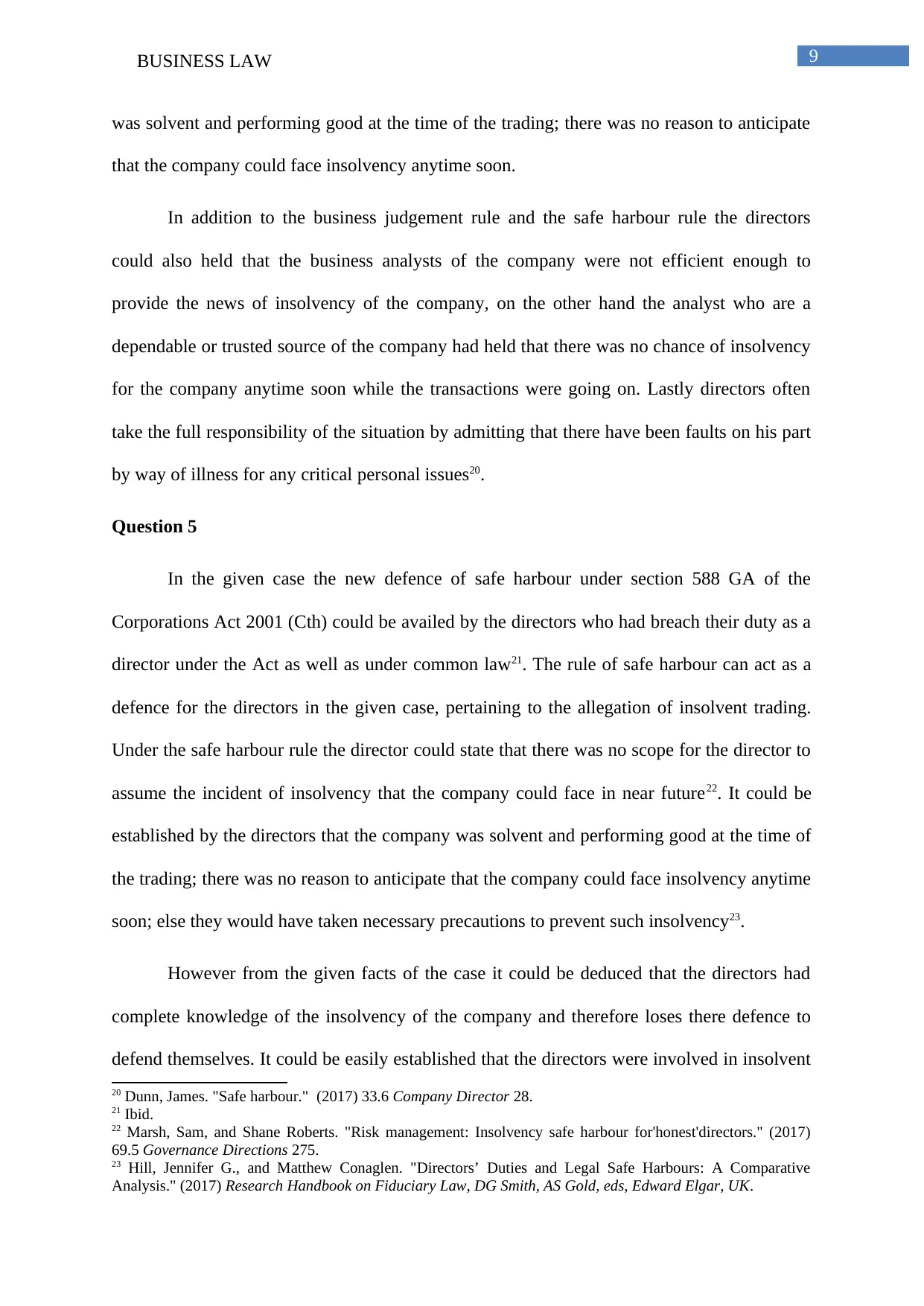
9BUSINESS LAW
was solvent and performing good at the time of the trading; there was no reason to anticipate
that the company could face insolvency anytime soon.
In addition to the business judgement rule and the safe harbour rule the directors
could also held that the business analysts of the company were not efficient enough to
provide the news of insolvency of the company, on the other hand the analyst who are a
dependable or trusted source of the company had held that there was no chance of insolvency
for the company anytime soon while the transactions were going on. Lastly directors often
take the full responsibility of the situation by admitting that there have been faults on his part
by way of illness for any critical personal issues20.
Question 5
In the given case the new defence of safe harbour under section 588 GA of the
Corporations Act 2001 (Cth) could be availed by the directors who had breach their duty as a
director under the Act as well as under common law21. The rule of safe harbour can act as a
defence for the directors in the given case, pertaining to the allegation of insolvent trading.
Under the safe harbour rule the director could state that there was no scope for the director to
assume the incident of insolvency that the company could face in near future22. It could be
established by the directors that the company was solvent and performing good at the time of
the trading; there was no reason to anticipate that the company could face insolvency anytime
soon; else they would have taken necessary precautions to prevent such insolvency23.
However from the given facts of the case it could be deduced that the directors had
complete knowledge of the insolvency of the company and therefore loses there defence to
defend themselves. It could be easily established that the directors were involved in insolvent
20 Dunn, James. "Safe harbour." (2017) 33.6 Company Director 28.
21 Ibid.
22 Marsh, Sam, and Shane Roberts. "Risk management: Insolvency safe harbour for'honest'directors." (2017)
69.5 Governance Directions 275.
23 Hill, Jennifer G., and Matthew Conaglen. "Directors’ Duties and Legal Safe Harbours: A Comparative
Analysis." (2017) Research Handbook on Fiduciary Law, DG Smith, AS Gold, eds, Edward Elgar, UK.
was solvent and performing good at the time of the trading; there was no reason to anticipate
that the company could face insolvency anytime soon.
In addition to the business judgement rule and the safe harbour rule the directors
could also held that the business analysts of the company were not efficient enough to
provide the news of insolvency of the company, on the other hand the analyst who are a
dependable or trusted source of the company had held that there was no chance of insolvency
for the company anytime soon while the transactions were going on. Lastly directors often
take the full responsibility of the situation by admitting that there have been faults on his part
by way of illness for any critical personal issues20.
Question 5
In the given case the new defence of safe harbour under section 588 GA of the
Corporations Act 2001 (Cth) could be availed by the directors who had breach their duty as a
director under the Act as well as under common law21. The rule of safe harbour can act as a
defence for the directors in the given case, pertaining to the allegation of insolvent trading.
Under the safe harbour rule the director could state that there was no scope for the director to
assume the incident of insolvency that the company could face in near future22. It could be
established by the directors that the company was solvent and performing good at the time of
the trading; there was no reason to anticipate that the company could face insolvency anytime
soon; else they would have taken necessary precautions to prevent such insolvency23.
However from the given facts of the case it could be deduced that the directors had
complete knowledge of the insolvency of the company and therefore loses there defence to
defend themselves. It could be easily established that the directors were involved in insolvent
20 Dunn, James. "Safe harbour." (2017) 33.6 Company Director 28.
21 Ibid.
22 Marsh, Sam, and Shane Roberts. "Risk management: Insolvency safe harbour for'honest'directors." (2017)
69.5 Governance Directions 275.
23 Hill, Jennifer G., and Matthew Conaglen. "Directors’ Duties and Legal Safe Harbours: A Comparative
Analysis." (2017) Research Handbook on Fiduciary Law, DG Smith, AS Gold, eds, Edward Elgar, UK.
Paraphrase This Document
Need a fresh take? Get an instant paraphrase of this document with our AI Paraphraser
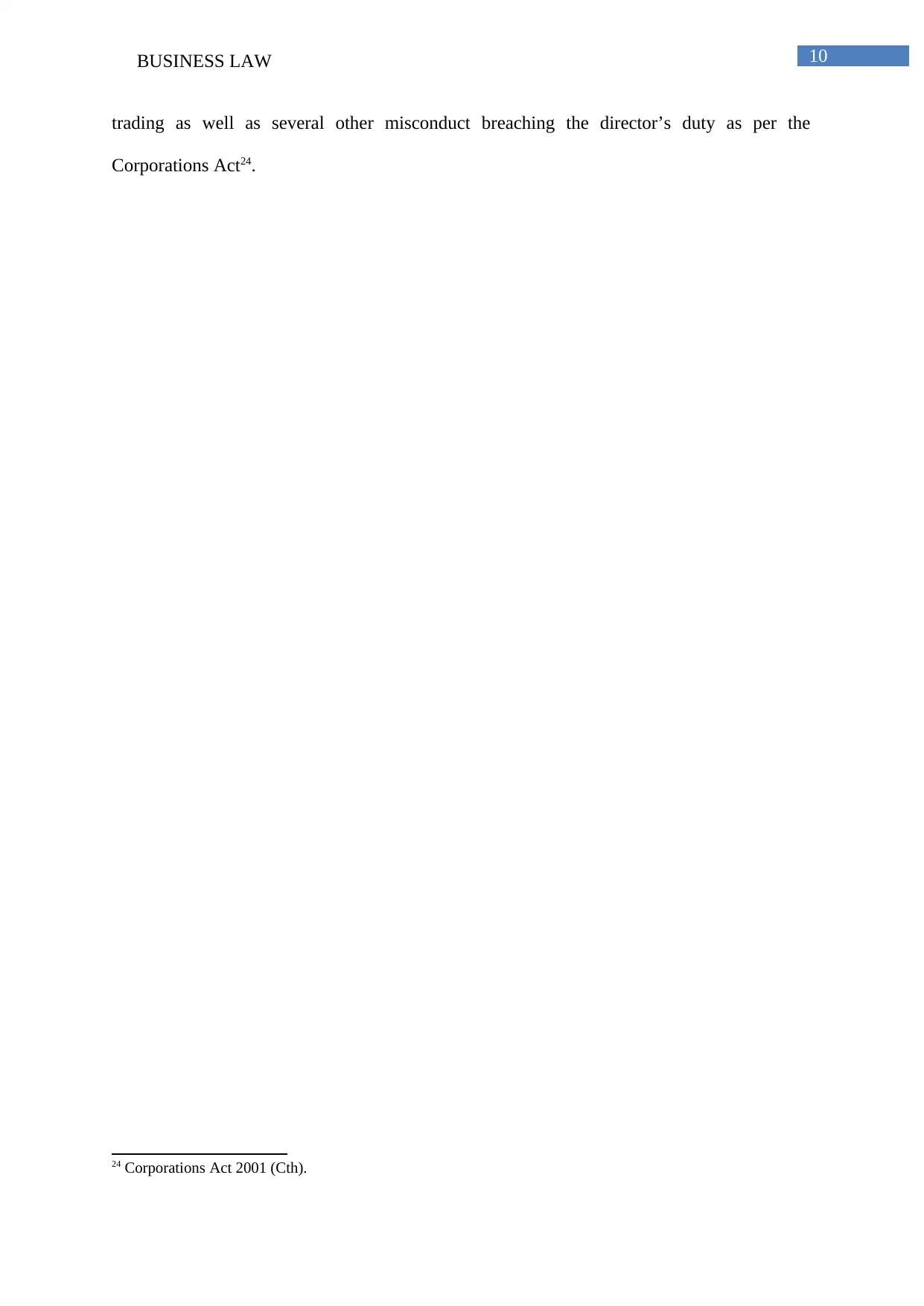
10BUSINESS LAW
trading as well as several other misconduct breaching the director’s duty as per the
Corporations Act24.
24 Corporations Act 2001 (Cth).
trading as well as several other misconduct breaching the director’s duty as per the
Corporations Act24.
24 Corporations Act 2001 (Cth).
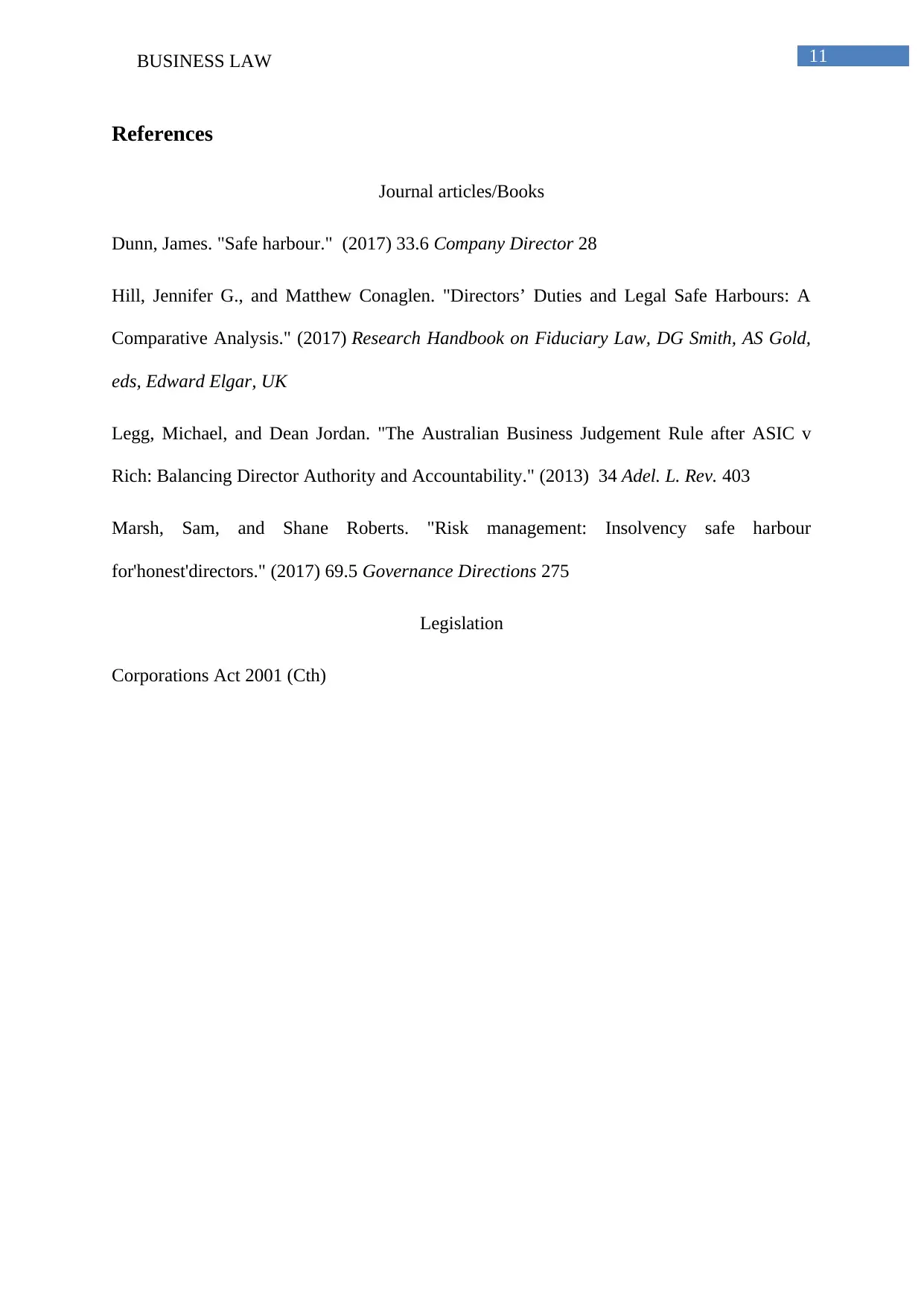
11BUSINESS LAW
References
Journal articles/Books
Dunn, James. "Safe harbour." (2017) 33.6 Company Director 28
Hill, Jennifer G., and Matthew Conaglen. "Directors’ Duties and Legal Safe Harbours: A
Comparative Analysis." (2017) Research Handbook on Fiduciary Law, DG Smith, AS Gold,
eds, Edward Elgar, UK
Legg, Michael, and Dean Jordan. "The Australian Business Judgement Rule after ASIC v
Rich: Balancing Director Authority and Accountability." (2013) 34 Adel. L. Rev. 403
Marsh, Sam, and Shane Roberts. "Risk management: Insolvency safe harbour
for'honest'directors." (2017) 69.5 Governance Directions 275
Legislation
Corporations Act 2001 (Cth)
References
Journal articles/Books
Dunn, James. "Safe harbour." (2017) 33.6 Company Director 28
Hill, Jennifer G., and Matthew Conaglen. "Directors’ Duties and Legal Safe Harbours: A
Comparative Analysis." (2017) Research Handbook on Fiduciary Law, DG Smith, AS Gold,
eds, Edward Elgar, UK
Legg, Michael, and Dean Jordan. "The Australian Business Judgement Rule after ASIC v
Rich: Balancing Director Authority and Accountability." (2013) 34 Adel. L. Rev. 403
Marsh, Sam, and Shane Roberts. "Risk management: Insolvency safe harbour
for'honest'directors." (2017) 69.5 Governance Directions 275
Legislation
Corporations Act 2001 (Cth)
⊘ This is a preview!⊘
Do you want full access?
Subscribe today to unlock all pages.

Trusted by 1+ million students worldwide
1 out of 12
Related Documents
Your All-in-One AI-Powered Toolkit for Academic Success.
+13062052269
info@desklib.com
Available 24*7 on WhatsApp / Email
![[object Object]](/_next/static/media/star-bottom.7253800d.svg)
Unlock your academic potential
Copyright © 2020–2026 A2Z Services. All Rights Reserved. Developed and managed by ZUCOL.





